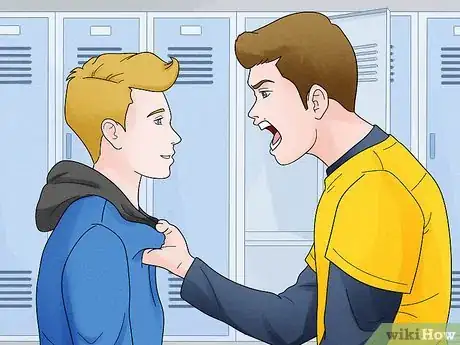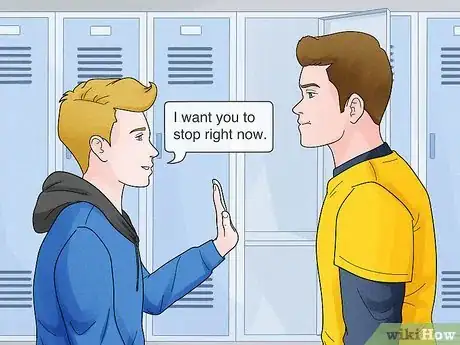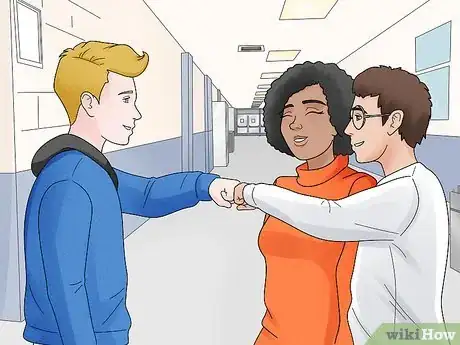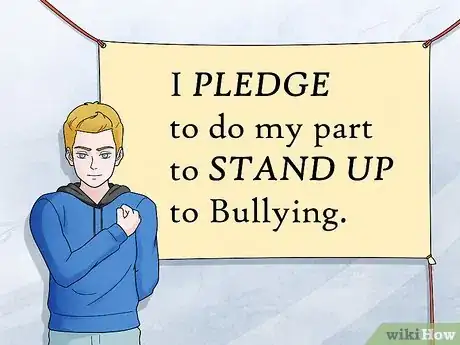This article was co-authored by Chloe Carmichael, PhD and by wikiHow staff writer, Christopher M. Osborne, PhD. Chloe Carmichael, PhD is a Licensed Clinical Psychologist who runs a private practice in New York City. With over a decade of psychological consulting experience, Dr. Chloe specializes in relationship issues, stress management, self esteem, and career coaching. She has also instructed undergraduate courses at Long Island University and has served as adjunct faculty at the City University of New York. Dr. Chloe completed her PhD in Clinical Psychology at Long Island University in Brooklyn, New York and her clinical training at Lenox Hill Hospital and Kings County Hospital. She is accredited by the American Psychological Association and is the author of “Nervous Energy: Harness the Power of Your Anxiety” and “Dr. Chloe's 10 Commandments of Dating.”
There are 7 references cited in this article, which can be found at the bottom of the page.
This article has been viewed 122,460 times.
Being bullied is one of the most stressful experiences you can face in high school. But always remember that you’re not alone, that you don’t deserve to be bullied, and that there are things you can do to stop it. This article lists lots of helpful ways to handle bullying, starting with immediate responses and moving on to longer-term solutions.
Steps
Stay calm and focused.
-
It’s hard to keep your cool, but it’s the only way to respond effectively. The bully is trying to get a big reaction out of you, such as crying or shouting. Instead of giving them what they want, focus on what you want—a good way to put a stop to their bullying! Take a couple of slow, deep breaths and bring your focus inward. Think about the situation and the best calm, focused, and effective way to respond to it.[1] X Research source
- It’s okay to feel anger or fear or sadness welling up inside—that’s completely natural and justified. But do your best to keep your cool so you can take control of the situation.
- In some situations, for example, you may see that walking away is the best option. Or, you may decide that telling the bully to stop forcefully or reasoning with them is the way to go.
Try walking away from them.
-
Ignoring an isolated bullying incident may end the problem. This tends to work best if a bully is seeking out a random target, rather than targeting you intentionally. In this case, ignoring them and walking away may cause them to lose interest since they won’t get a reaction from you. Walk away confidently and without fear, sending the message that the bully has no effect on you.
- If you find yourself having to repeatedly walk away from the same bully, or constantly having to find new routes in the school hallways or on your walk home, look for a more effective strategy.
- Don’t run away from a bully unless you are legitimately afraid. In this case, stay in high-traffic areas and get assistance from a teacher or other responsible adult as soon as you can.
Tell them to stop in a calm, firm voice.
-
Insist that they quit without using name-calling or violence. Staying quiet or attempting to reason with a bully who is specifically targeting you won’t work. Likewise, stooping to their level will only make things worse. Instead, look the bully straight in the eye and firmly but calmly say, “I want you to stop right now.” If the bully gets in your face, bring your arm across your chest to use it as a barrier, then repeat your statement.[2] X Research source
- If the bully still continues, hold your ground and keep repeating, "Stop. I want you to stop right now. Stop," or loudly say, "Stop! Leave me alone!" Don't say or do anything else but continue to repeat these phrases.
Reason with them if possible.
-
Explain that they’re being hurtful and encourage them to do better. Talking to a bully can be challenging, but it might bring self-awareness to their demeaning behavior. This is especially true when the bully doesn’t seem to realize the impact of their words or actions. Be calm and direct, and aim to build the person up instead of putting them down. For example, say, “I think you are too smart to behave this way and know you can do better,” or, "Be cool for real and don't talk to me or other people that way."[3] X Research source
- Show confidence. Confidence is expressed through the words you choose and your own body language. Remember to stand tall, with your head held high.
- Don’t bother with this method if the bully knows exactly what they’re doing and is intentionally trying to hurt you.
Report serious or repeated bullying.
-
Tell a teacher, coach, counselor, or other authority figure in school. If the bully is threatening your safety, run, shout, and do what you need to get help right away. If you’re reporting a bullying incident after the fact, tell the authority figure all of the following: what happened, who the bully is, where and when the bullying took place, how long it's been happening, and how it makes you feel. Don’t be afraid to ask them what they will do to help stop the bullying—it’s their job to keep you safe.[4] X Research source
- If you’re nervous, consider taking a friend with you so that you feel more comfortable.
- If you’re worried about forgetting any important details, write down what's been happening before the meeting.
- If the person you talk to doesn’t take concrete steps to help, seek help from another authority figure. Keep going until you get the help you need and the bullying behavior is resolved.
Open up to a parent/guardian.
-
Explain what’s happening and let them help you directly or indirectly. If you feel like you can handle the bullying yourself, tell your parent(s) about the situation and ask them for moral support and practical ideas for handling the problem. That said, never be ashamed to ask for their direct help in dealing with bullying, especially if your own efforts haven’t worked. They can contact your teachers and other school administrators and get things done in ways you may not be able to.[5] X Research source
- You might say something like this: “Dad, I’m having a problem with a bully in gym class. I have some ideas for the best way to handle it myself, but I’d like to explain the situation to you and get any advice you have.”
- Show your parent(s) that you’re mature and capable of handling problems, and they’ll be more likely to trust and support you.
Ask a friend for help.
-
A real friend will give you much-needed support and useful advice. Sharing your experience may lead your friend to also open up about experiences they’ve had with bullies. They’ll likely also offer genuine empathy and a true desire to help you. This is really important, because knowing you’re not alone means a great deal when you’re being bullied. You can also talk openly and honestly about positive strategies for dealing with the problem.[6] X Research source
- If, for example, there’s a nasty rumor being spread about you, set the record straight by letting your friend know what's true and untrue. Hearing them say, “I understand and don’t believe these lies,” can really help a lot.
- A friend can also help out by, for instance, walking to class with you so you’re not alone when you have to pass by a bully.
Choose a positive social circle.
-
Spend your time with true friends who are kind and supportive. If your current social circle includes people who don’t seem to care that you’re being bullied—or, even worse, take part in the bullying—make a change. Here’s a rule of thumb: if you tend to feel nervous or stressed around the people you hang out with, they’re probably not true friends. Real friends make you comfortable being yourself and sharing your feelings.
- Drifting away from current friendships and developing new ones is never easy. But it’s important to do what’s best for your own wellbeing. You deserve friends who accept you as you are and don’t tolerate bullying.
- Stick with friends who stand up for you and each other. Bullies are less likely to harass you if you have strong friends who support you.
Support anti-bullying efforts.
-
Encourage the student body—or lead it—to stand against bullying. If your school has an anti-bullying program, join it. If it doesn’t have one, start it up with some of your friends! Work with teachers, school staff, and parents to set policies against harassment and create goals for a positive and supportive school environment. Working together is the best way to change your school’s culture.[7] X Research source
- You might, for example, help set up a program of student hall monitors who keep an eye out for instances of bullying.
Accept and take care of yourself.
-
You deserve to be happy being yourself. It’s important to remember that bullying is more about the other person’s issues than it is about you. Instead of trying to change who you are in an effort to stop the bullying, stay true to yourself by embracing your unique qualities and talents. Take positive steps to achieve happiness, including doing things that you like and seeking out help and support as needed.[8] X Expert Source

Licensed Clinical Psychologist Expert Interview. 29 May 2019.- Pursue the things that make you feel at your best. Join a club or sport like track and field or drama. Get involved in school activities like yearbook or the school newspaper.
- Take time to appreciate the good things you have and the accomplishments you’ve achieved. For example, write down a list of your good qualities each morning and your accomplishments each evening.
- If you are experiencing long-term feelings of emotional distress that are affecting your self-esteem, relationships, and/or education, reach out to a mental health professional like a school counselor, licensed therapist, or doctor.
You Might Also Like











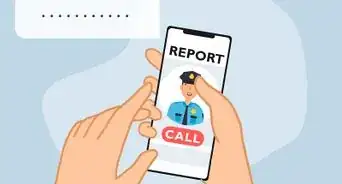


References
- ↑ http://www.stompoutbullying.org/index.php/information-and-resources/about-bullying-and-cyberbullying/are-you-being-bullied/
- ↑ http://www.stompoutbullying.org/index.php/information-and-resources/about-bullying-and-cyberbullying/are-you-being-bullied/
- ↑ https://www.ece.gov.nt.ca/en/services/stop-bullying-nwt/tips-deal-bullies
- ↑ http://kidshealth.org/teen/school_jobs/bullying/bullies.html#
- ↑ https://dr-carol.com/2017/02/27/how-to-tell-your-parents-your-being-bullied/
- ↑ https://kidshealth.org/en/teens/bullies.html
- ↑ https://www.universityofcalifornia.edu/news/successful-anti-bullying-program-found-ucla
- ↑ Chloe Carmichael, PhD. Licensed Clinical Psychologist. Expert Interview. 29 May 2019.
About This Article

